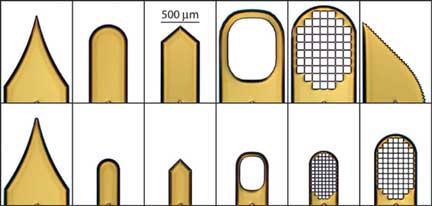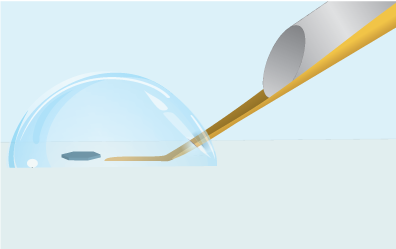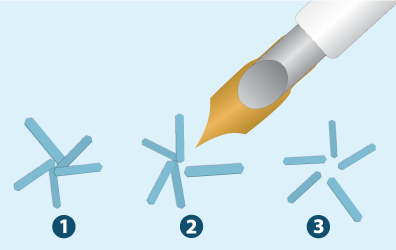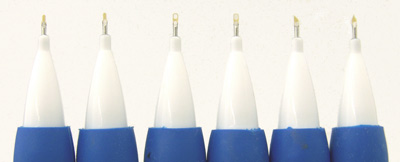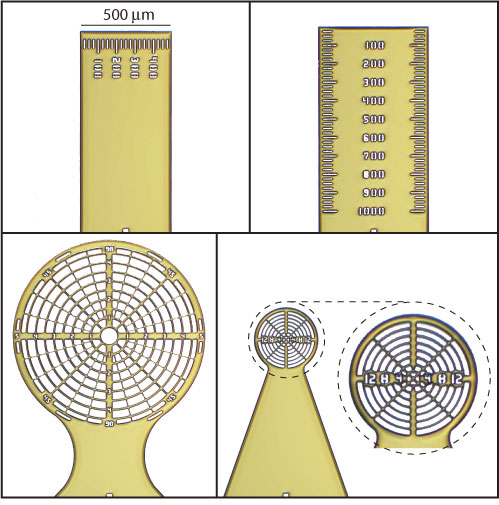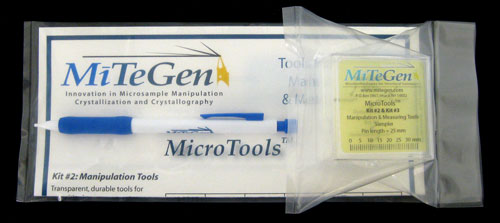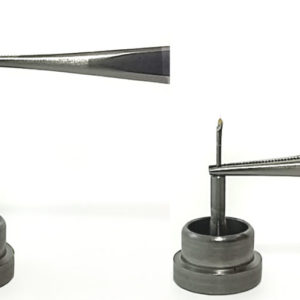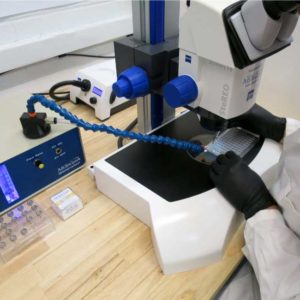MicroTools
These tools have tips made from soft, flexible microfabricated polymer films. Tip curvature gives them rigidity, but they can still easily be flexed to conform to a well or slide surface. These tools are far less likely to damage fragile samples than metal microtools, and are optically and X-ray transparent. Use for protein crystals, single cells and other small samples.
MicroTools Kit 1 Information MicroTools Kit 2 Information MicroTools Kit 3 InformationProduct Information
Kit 1-
Our Original MicroTool kit, containing 20 tools for common sample manipulations and measurements. These tools have tips made from soft, flexible microfabricated polymer films. Tip curvature gives them rigidity, but they can still easily be flexed to conform to a well or slide surface. These tools are far less likely to damage fragile samples than metal microtools, and are optically and X-ray transparent. Use for protein crystals, single cells and other small samples.
The tips of these tools are 12.5 micrometers thick and can be used to support samples in X-ray beams, producing less background scatter. They are less durable than the thicker tools in Kit 2.
Each tool is mounted on a 0.025″/ 0.64 mm diameter nonmagnetic solid stainless steel rod. Hold them in a standard 0.7 mm mechanical pencil (included with each kit), or in a micromanipulator.
Each kit contains:
- MicroSpoon™: One each of small, medium and large sizes. Use to push, detach from surfaces, separate from a cluster, lift, and transfer. Push down to flatten tip and slide under your sample.
- MicroChisel™: One each of small, medium and large sizes. Use to push, detach from surfaces, separate from a cluster, lift, and transfer. Push down to flatten tip and slide under your sample.
- MicroLasso™: One each of small and large sizes. Use like a loop to lasso, pull and detach a sample from a surface.
- MicroSieve™: One each of small, medium and large sizes. Use to sieve samples out of solution, and to lift, transfer and soak.
- MicroTip™: One 50 micrometer diameter tip. Use to poke, separate and lift samples. Also use to reposition samples on a MicroMount or MicroMesh.
- MicroGripper™: One each of small, medium and large sizes. Push down onto your sample to firmly capture it, or slide underneath your sample to delicately support it. Holds crystals rigidly without damaging them for room temperature X-ray measurements.
- MicroRuler™: One 600 micrometer wide ruler, with 25 micrometer gradations.
- MicroSaw™: Two saws. Use in conjunction with a needle to cut and remove protein skins, gels, dense lipid phases and soft tissues from around your sample.
Kit 2-
Based upon customer feedback, we’ve separated out the sample manipulation tools in Kit 1, modified their designs, and made them thicker and more durable. The ideal kit for common sample manipulation tasks.
As with Kit 1, these tools have tips made from soft, flexible microfabricated polymer films. Tip curvature gives them rigidity, but they can still easily be flexed to conform to a well or slide surface. These tools are far less likely to damage fragile samples than metal microtools, and are optically and X-ray transparent. Use for protein crystals, single cells and other small samples.
The tips of these tools are 18 micrometers thick, so they generate more background X-ray scatter in X-ray beams than the tools in Kit 1 (but still less than other commercial X-ray sample mounting technologies.)
Each tool is mounted on a 0.025″/ 0.64 mm diameter nonmagnetic solid stainless steel rod. Hold them in a standard 0.7 mm mechanical pencil (included with each kit), or in a micromanipulator.
Each kit contains:
- MicroTip™: Two each of 25 and 50 micrometer diameter tips. Use to poke, separate and lift samples. Also use to reposition samples on a MicroMount or MicroMesh. Shape is designed to minimize disturbance of surrounding liquid while maximizing tip rigidity.
- MicroSpoon™: Two small and one large size. Use to push, detach from surfaces, separate from a cluster, lift, and transfer. Push down to flatten tip and slide under your sample.
- MicroChisel™: Two small and one large size. Use to push, detach from surfaces, separate from a cluster, lift, and transfer. Push down to flatten tip and slide under your sample.
- MicroLasso™: Two small and one large size. Use like a loop to lasso, pull and detach a sample from a surface.
- MicroSieve™: Two small, two medium and one large size. Use to sieve samples out of solution, and to lift, transfer and soak.
- MicroSaw™: Two saws. Use in conjunction with a needle to cut and remove protein skins, gels, dense lipid phases and soft tissues from around your sample.
Kit 3-
MicroTool™ Kit 3 contains 20 tools for sample measurements. Two tool designs allow measurement of linear sample dimensions, and two allow measurement of both linear and angular dimensions. Use them to accurately measure small and fragile samples with minimal chance of sample damage. The tool tips are 10 micrometers thick and are both optically and X-ray transparent.
Measurements using microscope reticles are rendered inaccurate if the sample dimension of interest is not perpendicular to the viewing direction, or if the sample is contained in an optically distorting liquid drop. To get accurate measurements, just position these transparent tools next to, under or on top of your sample. Dispense sample-containing liquid onto the tool or dip the tool into sample-containing liquid or powder.
Each tool is mounted on a 0.025″/ 0.64 mm diameter nonmagnetic solid stainless steel rod. Hold them in a standard 0.7 mm mechanical pencil (included with each kit), or in a micromanipulator.
Each kit contains:
Horizontal MicroRuler™: Five 500 micrometer wide horizontal rulers with 25 micrometer gradations.
Vertical MicroRuler™: Five 1000 micrometer long vertical rulers with 25 micrometer gradations.
Large MicroProtractor™: Five 1000 micrometer diameter tools for measuring angles and radial distances/dimensions, with 15 degree and 50 micrometer gradations. Use to measure facet angles on crystals, the major and minor axes of ellipsoidal samples, or to specify the polar coordinates of multiple samples on a single tool.
Small MicroProtractor™: Five 320 micrometer diameter tools for measuring angles and radial distances/dimensions, with 30 degree and 20 micrometer gradations.
You may also like…
-
Reusable Goniometer Base Styles
Quickly assemble MiTeGen Mounts, Loops, and Meshes into bases for crystal harvesting, without using glue or... -
Watershed – Optimized Crystal Harvesting
Prevent loss or damage to the crystals that you’ve spent time growing and optimizing. The Watershed™...

